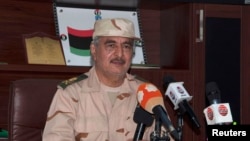Libya’s internationally-recognized parliament - one of two competing for power - has agreed to return to U.N.-sponsored peace talks. But the decision to appoint a renegade anti-Islamist general as the commander-in-chief of its forces is likely to deepen divisions in the conflict-wracked country.
The decision to appoint Major General Khalifa Belgacem Haftar risks derailing U.N.-sponsored talks set to resume Thursday in neighboring Morocco, European diplomats fear. The retired general launched a self-declared offensive last year against Islamists in the eastern city of Benghazi and hasn’t hidden his ambitions to become Libya’s president.
On Monday, the speaker of the parliament based in Tobruk, Aguila Salah, announced his pick for the post, saying “I’ve chosen Major General Khalifa Haftar for the post of commander-in-chief of the army after promoting him to the rank of lieutenant general.”
His appointment isn’t to the liking of all the members of the Tobruk-based parliament, elected in national polls in June. Last month, a prominent member of the parliament’s national security committee, Mosab Al-Abed, insisted Haftar would never be chosen as head of the Libyan National Army. He is raising a dispute now over whether the speaker has the authority to make the appointment without approval of the defense panel.
The appointment of Haftar, a onetime ally of Moammar Gadhafi who later broke with him and in 2011 joined the revolution that toppled the Libyan strongman, prompted protests from the rival pro-Islamist parliament, known as the General National Congress, in the Libyan capital of Tripoli, which rejected the disputed June polls.
“Khalifa Haftar for us is a war criminal,” says GNC spokesman Omar Hmaidan. “This measure will add to escalation and complicate things.” Libya Dawn, a coalition of Islamist militias some from the powerful town of Misrata that controls Tripoli and backs the rival government based in the Libyan capital, insists there can be no political settlement that includes Haftar. The GNC is a former elected assembly that was reinstalled by Libya Dawn.
Last week, the Tobruk-based parliament suspended participation in talks that U.N. envoy Bernardino Leon has tried to broker. The parliament said it did so in response to Western pressure to include Islamists in a future government. “Haftar’s appointment sends a signal that Tobruk agrees with Haftar that anyone opposed to it is an extreme Islamist,” a European diplomat, who declined to be identified for this article, told VOA. “It isn’t a peacemaking choice.”
Prime Minister Abdullah al-Thinni's government and the Tobruk-based House of Representatives quit U.N. talks in February hours after a double suicide bombing in the eastern town of al-Qubbah killed 45 people and wounded another 70.
Last month’s barbaric mass execution of 21 Egyptian Coptic Christians held by militants affiliated to the so-called Islamic State group has added urgency to the effort by the U.N. to establish a political dialogue in Libya. Western powers fear the emergence of an affiliate of the Islamic State group will drag the country deeper into the lawlessness that has swept Libya since Gadhafi’s ouster.
Egypt, which is backing al-Thinni’s government, launched retaliatory strikes for the massacre and has warned it may intervene more heavily in its neighbor in the coming days.
On Monday, Italy, which along with France has been leading calls for a global diplomatic push to stabilize Libya, began naval exercises off the coast of Libya. Italian naval officials insist the exercises are a resumption of annual military maneuvers that were suspended last year because of the higher priority being given to search-and-rescue missions for the thousands of sub-Saharan migrants making their way to Italy in rickety boats from Libyan shores.
Hundreds of migrants have been drowned trying to make the Mediterranean Sea crossing.
Admiral Pierpaolo Ribuffo, the officer in command of exercises, said in a statement the operation was not directly connected with the Libyan crisis. “We're training our ships and our men, that's all,” he said. But he admitted to the Reuters news agency that the increased presence of naval vessels could help improve security.
The Tobruk parliament has set a string of conditions for its return to talks. It is demanding the international community acknowledge its forces are fighting terrorism. It has also laid the pre-condition that it will have the final say on the make-up of any government that might emerge from successful negotiations - a demand unacceptable to Libya Dawn.
Now with Haftar’s appointment - he is scheduled to be sworn in as commander-in-chief Tuesday or Wednesday - the talks are likely to be even more challenging.
The 66-year-old general has long been a divisive figure. In February 2014 he appeared on Libyan television to announce he had suspended Libya's then government - a claim ridiculed by then Prime Minister Ali Zeidan.
After that Haftar focused on building alliances with a variety of militias and launched his Benghazi offensive on hardline Islamist militias. Some Libyans argue the general is a much needed figure: a strongman able to knock heads together.
“This was inevitable,” noted Abdulhadi Soliman in one Facebook debate between Libyan political activists. “He was the only one who tried to do something about the security in Benghazi. Yes there are risks but its like 2011, we knew the risks of foreign intervention but what other option did Libyans have at that time? What options do we have now?”
Other activists argue his rise is a sign that the old guard from the Gaddafi era is returning.




